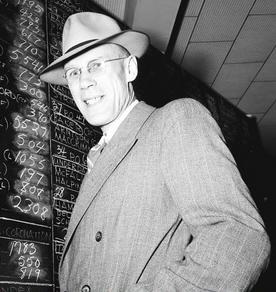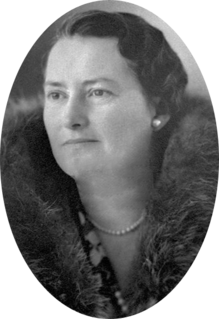The 1910 municipal election was held December 12, 1910 for the purpose of electing a mayor and five aldermen to sit on the Edmonton City Council, as well as three public school trustees and five separate school trustees. There were also four proposed bylaws put to a vote of the electorate concurrently with the election.
The 1916 municipal election was held December 11, 1916 to elect a mayor and six aldermen to sit on Edmonton City Council, three trustees to sit on the public school board, and four trustees to sit on the separate school board.
The 1918 municipal election was held December 9, 1918 to elect a mayor and six aldermen to sit on Edmonton City Council, three trustees to sit on the public school board, and four trustees to sit on the separate school board.
The 1920 municipal election was held December 13, 1920, to elect a mayor and six aldermen to sit on Edmonton City Council and three trustees to sit on the public school board. J Cormack, Joseph Gariépy and J J Murray were acclaimed to two-year terms on the separate school board. In the election's only plebiscite, Edmontonians rejected a proposal to pay their aldermen for the second consecutive election.
The 1921 municipal election was held December 12, 1921 to elect a mayor and seven aldermen to sit on Edmonton City Council and four trustees to sit on the public school board. F A French, Paul Jenvrin, Thomas Magee, and Joseph Henri Picard were acclaimed to two-year terms on the separate school board.
The 1922 municipal election was held December 11, 1922 to elect a mayor and six aldermen to sit on Edmonton City Council and three trustees to sit on the public school board. R Crossland, P M Dunne, Joseph Gariépy, and J J Murray were acclaimed to two-year terms on the separate school board.
The 1925 municipal election was held December 14, 1925 to elect a mayor and seven aldermen to sit on Edmonton City Council and four trustees to sit on each of the public and separate school boards. In the election's only plebiscite, the voters also rejected a proposal to increase the mayor's term from one year to two.
The 1928 municipal election was held December 10, 1928 to elect a mayor and six aldermen to join Edmonton City Council and three trustees to join the public school board during the year of 1929 and 1930. Three trustees were elected by acclamation to join the separate school board for 1929 and 1930.
The 1930 municipal election was held November 12, 1930 to elect a mayor and five aldermen to sit on Edmonton City Council and four trustees to sit on the public school board, while three trustees were acclaimed to the separate school board. This was the first election to be held in November; where elections had previously been held on the second Monday of December, beginning in 1930 they were held on the second Wednesday of November to encourage voter turnout.
The 1936 municipal election was held November 12, 1936 to elect a mayor and five aldermen to sit on Edmonton City Council and three trustees to sit on the public school board, while three trustees were acclaimed to the separate school board. Voters also rejected a proposal to extend the mayor's term to two years. The election would normally have been held on November 11, but was delayed by a day owing to the Armistice Day holiday.
The 1942 municipal election was held November 12, 1942 to elect a mayor and five aldermen to sit on Edmonton City Council, three trustees to sit on the public school board and five trustees to sit on the separate school board. Voters also approved an eight-hour day for firefighters. The election would normally have been held on November 11, but was delayed by a day owing to the Armistice Day holiday.
The 1947 municipal election was held November 5, 1947 to elect a mayor and five aldermen to sit on Edmonton City Council and four trustees to sit on the public school board, while four trustees were acclaimed to the separate school board. Voters also voted on two plebiscites, one of which approved two-year mayoral terms. Accordingly, Harry Ainlay's election made him the first mayor of Edmonton to serve a two-year term.
The 1951 municipal election was held November 7, 1951 to elect a mayor and five aldermen to sit on Edmonton City Council and four trustees to sit on the separate school board, while four trustees were acclaimed to the public board. The electorate also decided four plebiscite questions.
The 1952 municipal election was held October 15, 1952 to elect five aldermen to sit on Edmonton City Council and three trustees to sit on the separate school board, while three trustees were acclaimed to the public board. There was no election for mayor, as William Hawrelak was halfway through his two-year term. The electorate also decided four plebiscite questions.
The 1953 municipal election was held October 14, 1953 to elect six aldermen to sit on Edmonton City Council and four trustees to sit on the separate school board, while the mayor and four trustees for the public school board were acclaimed. The electorate also decided five plebiscite questions.
The 1954 municipal election was held October 13, 1954 to elect five aldermen to sit on Edmonton City Council and three trustees each to sit on the public and separate school boards. The electorate also decided seven plebiscite questions. No election was held for mayor, as William Hawrelak was one year into a two-year term.
The 1956 municipal election was held October 17, 1956 to elect five aldermen to sit on Edmonton City Council and three trustees to sit on each of the public and separate school boards. The electorate also decided nine plebiscite questions. There was no election for mayor, as William Hawrelak was one year into a two-year term.
The 1957 municipal election was held November 3, 1957 to elect a mayor and five aldermen to sit on Edmonton City Council and four trustees to sit on the public school board. The electorate also decided seven plebiscite questions.
The 1960 Edmonton, Alberta municipal election was held October 19, 1960, to elect five aldermen to sit on Edmonton City Council and three trustees to sit on each of the public and separate school boards. The electorate also decided eight plebiscite questions.
The 1963 municipal election was held October 16, 1963 to elect a mayor and six aldermen to sit on Edmonton City Council and four trustees to sit on each of the public and separate school boards. The electorate also decided three plebiscite questions.




